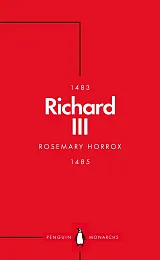Richard III (Penguin Monarchs)
Richard III (Penguin Monarchs)
Opis publikacji
No English king has so divided opinion, both during his reign and in the years since, more than Richard III. He was loathed in his own time for the never-confirmed murder of his young nephews, the Princes in the Tower, and died fighting his subjects on the battlefield. This is the vision of Richard we have inherited from Shakespeare, villainous and hunchbacked. Equally, he inspired great loyalty in his followers, who saw him as a victim of circumstance,backed into a corner by his brother's in-laws, the self-aggrandizing Woodville family. In this enlightening,even-handed study, Rosemary Horrox builds a complex picture of a king who by any standard metric failed as a monarch. He was killed after only two years on the throne, without an heir, and brought such a decisive end to the House of York that Henry Tudor was able to seize the throne, despite his extremely tenuous claim. Whether Richard was undone by his own fierce ambition, or by the legacy of a Yorkist dyn...
No English king has so divided opinion, both during his reign and in the years since, more than Richard III. He was loathed in his own time for the never-confirmed murder of his young nephews, the Princes in the Tower, and died fighting his subjects on the battlefield. This is the vision of Richard we have inherited from Shakespeare, villainous and hunchbacked. Equally, he inspired great loyalty in his followers, who saw him as a victim of circumstance, backed into a corner by his brother's in-laws, the self-aggrandizing Woodville family. In this enlightening, even-handed study, Rosemary Horrox builds a complex picture of a king who by any standard metric failed as a monarch. He was killed after only two years on the throne, without an heir, and brought such a decisive end to the House of York that Henry Tudor was able to seize the throne, despite his extremely tenuous claim. Whether Richard was undone by his own fierce ambition, or by the legacy of a Yorkist dynasty which was already profoundly dysfunctional, the end result was the same: Richard III destroyed the very dynasty which he had spent his life so passionately defending.




